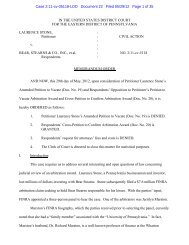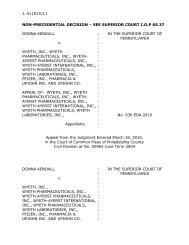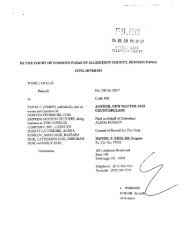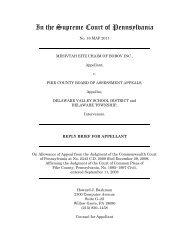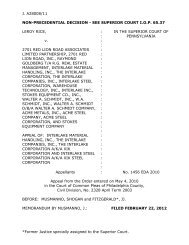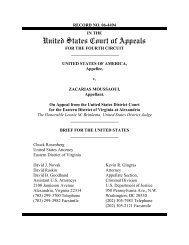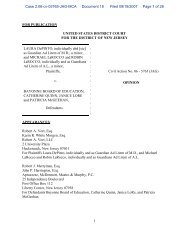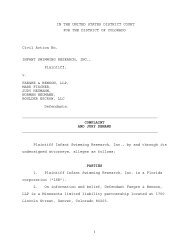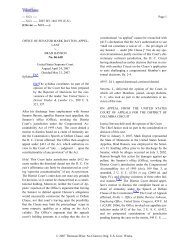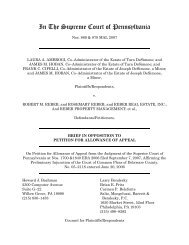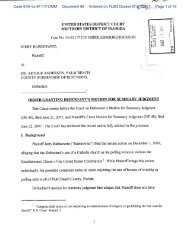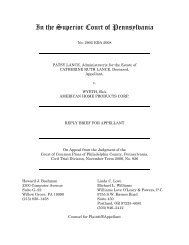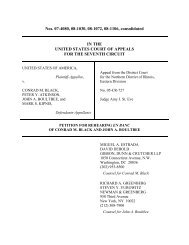In the Superior Court of Pennsylvania - How Appealing
In the Superior Court of Pennsylvania - How Appealing
In the Superior Court of Pennsylvania - How Appealing
You also want an ePaper? Increase the reach of your titles
YUMPU automatically turns print PDFs into web optimized ePapers that Google loves.
large. That is simply unrealistic and not feasible given <strong>the</strong><br />
circumstances. It is nonsensical to require a layperson to know what<br />
learned medical pr<strong>of</strong>essionals did not even know about HRT. It is<br />
<strong>the</strong>refore entirely unreasonable to require a patient without any<br />
medical training to make <strong>the</strong> logical connection between her ingestion<br />
<strong>of</strong> HRT drugs and her breast cancer and possess a reasonable belief<br />
that she could sue Wyeth for her injuries before <strong>the</strong> WHI findings were<br />
released to <strong>the</strong> public. This court is convinced that <strong>the</strong> warnings <strong>the</strong><br />
plaintiff read effectively chilled her inquiry as to <strong>the</strong> causative nature<br />
<strong>of</strong> her cancer.<br />
R.1623a–24a (Deutsch v. Wyeth, HRT Mass Tort Case, MID–L–998–06 MT (N.J.<br />
Super. Ct. Law Div.) (June 14, 2007), at 9–10).<br />
A Nevada trial court has likewise rejected defendants’ invocation <strong>of</strong> <strong>the</strong><br />
statute <strong>of</strong> limitations on a similar record:<br />
The <strong>Court</strong> is unable to conclude that Ms. Sc<strong>of</strong>ield possessed <strong>the</strong><br />
requisite information to commence <strong>the</strong> running <strong>of</strong> <strong>the</strong> statute. <strong>In</strong>deed,<br />
reasonable diligence would have revealed a confusing tangle <strong>of</strong><br />
ambiguous and contradictory knowledge in <strong>the</strong> scientific community<br />
regarding <strong>the</strong> role <strong>of</strong> HT in relation to breast cancer.<br />
R.1629a (McCreary v. Wyeth, No. CV04–1699 (2d Dist. Ct. Nev.) (Apr. 5, 2007), at<br />
3).<br />
<strong>In</strong> common with <strong>the</strong> law being applied by <strong>the</strong> U.S. <strong>Court</strong> <strong>of</strong> Appeals for <strong>the</strong><br />
Eighth Circuit, which exercises appellate jurisdiction over <strong>the</strong> federal MDL court in<br />
Arkansas assigned to preside over hormone replacement <strong>the</strong>rapy breast cancer<br />
litigation in <strong>the</strong> federal court system, and <strong>the</strong> state courts in New Jersey and<br />
Nevada, <strong>the</strong> <strong>Superior</strong> <strong>Court</strong> correctly ruled under <strong>Pennsylvania</strong> law that<br />
defendants’ summary judgment motions based on statute <strong>of</strong> limitations grounds<br />
should have been denied. The <strong>Superior</strong> <strong>Court</strong>’s decision reversing <strong>the</strong> entry <strong>of</strong><br />
– 35 –



